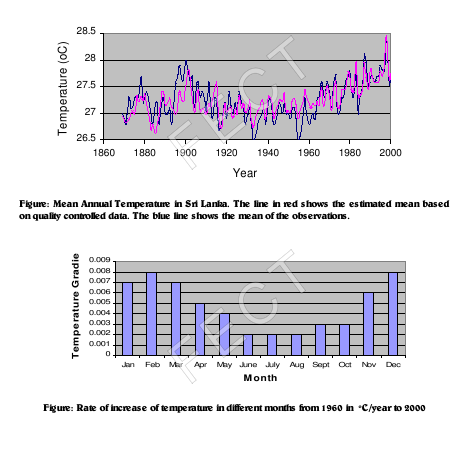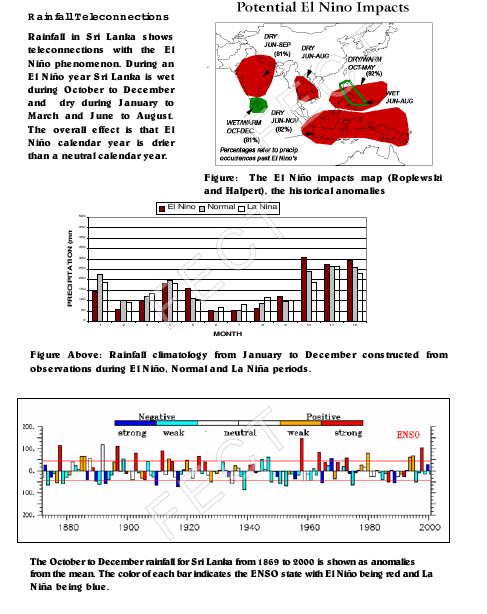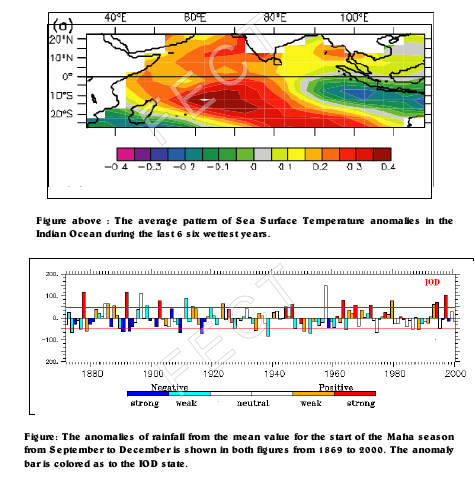Climate Diagnosis
Climate diagnosis is the attempt to understand the characteristics of the climate and to delineate the key mechanisms. Such understanding leads to the potential to predict climate. We have estimated long-term trends and investigated the impact of two of the principal modes of inter-annual variability, namely, the El Niño-Southern Oscillation and the Indian Ocean Dipole. Future work shall include studies of other regional factors such as Eurasian snow cover and volcanic activity on Sri Lanka’s climate.
| Activity |
Objectives
|
Partners | Status | Next Steps |
| Climate Variability Diagnostics |
Conduct definitive studies on the climate modes affecting Sri Lanka to lead to best possible predictions.
|
IRI, Frontier Research System for Global Change |
Diagnostics of ENSO and Indian Ocean Dipole mature now. Work needed on Indian ocean warming,
atmospheric pollution impacts and volcanic impacts |
Complete publications of current work, Work on decadal variability and trends, Work on pollution, volcanic
activity and radiation impac |
| Climate Change Diagnostics |
Assess climate change in the observational record. Assess quality of climate change projections for Sri
Lanka from IPCC. |
Department of Meteorology |
Climate change diagnostics on mean, maximum and minimum temperature and diurnal range and rainfall
completed. Internal Reports prepared. |
Publications in Journals |
| Hydrological Variability and Change |
Assess modes of hydrological variability. Develop hydrological predictions using statistical techniques.
|
Mahaweli Authority of Sri Lanka |
Analysis on ENSO dependence of Kelani and Mahaweli streamflow published. Decadal changes in
hydro-climatology published. |
Publish paper on Indian Ocean impacts. Develop statistical prediction scheme for streamflow |
Climate Change Assessments for Sri Lanka
Global climate change has a spatially varying character and precise understanding of change in different regions is needed. Our estimates of changing temperature show modest differences in estimates of the warming trend for most stations for the period from 1960-2001 but larger differences for earlier periods. There is a trend of 2.6 oC/100 years of warming trend in annual average maximum temperature and 1.7 oC/100 years for annual average minimum temperature from 1961-2000. These warming trends vary both seasonally and regionally.
Climate
Analysis – El Niño

Climate Analysis – Indian Ocean Dipole

Papers
- April 2006: The strengthening relationship between ENSO and the North-East Monsoon over Sri Lanka and Southern India, Lareef Zubair and C.F. Ropelewski, Journal of Climate, 19 (8): 1567–1575.
- March 2006: The predictability of Sri Lanka Climate based on ENSO, Lareef Zubair, under review, International Journal of Climatology.
- January 2003: Lareef Zubair, S.C. Rao and T. Yamagata, An Indian Ocean Influence on the Sri Lankan Maha Rainfall, Geophysical Research Letters. 10 (2) 1063-1066.
Conference Proceedings
Nov 2004: with Upamala Tennakoon and Manjula Siriwardhana, Climate Change Assessments for Sri Lanka from Quality Evaluated Data, International Conference on Sustainable Water Resources Management in the Changing Environment of the Monsoon Region, United Nations University, Colombo, Sri Lanka.
Presentations
- January 2003: Climate Prediction for Water Resources Management in Sri Lanka, Office of the Minister of Water Resources and Irrigation, Colombo.
- January 2003: Seasonal Climate Predictions and its Applications in Sri Lanka, International Water Management Institute, Colombo.
- December 2002: Climate Predictions for Sri Lanka, Center for Environmental Studies, University of Peradeniya, Peradeniya, Sri Lanka.
- December 2002: Climate Predictions for Mahaweli River Basin Management, Mahaweli Authority of Sri Lanka, Colombo, Sri Lanka.
- March 2003: Applications of Seasonal Climate Predictions, University of Peradeniya, Kandy.
- May 2002: Climate Change, Climate Variability and Water Resources, School of Engineering, Tokyo University, Japan.
- August 2000: Climate Prediction for Sri Lanka, Institute of Engineers, Sri Lanka.